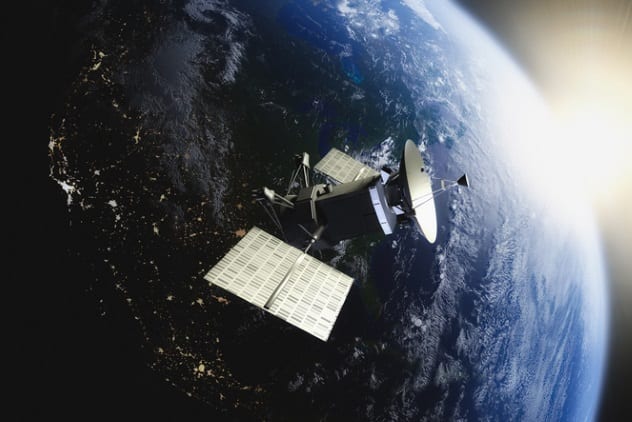 History
History  History
History  Movies and TV
Movies and TV 10 Movie Adaptations That Ruined Everything for Some Fans
 History
History 10 Dirty Government Secrets Revealed by Declassified Files
 Weird Stuff
Weird Stuff 10 Wacky Conspiracy Theories You Will Need to Sit Down For
 Movies and TV
Movies and TV 10 Weird Ways That TV Shows Were Censored
 Our World
Our World 10 Places with Geological Features That Shouldn’t Exist
 Crime
Crime 10 Dark Details of the “Bodies in the Barrels” Murders
 Animals
Animals The Animal Kingdom’s 10 Greatest Dance Moves
 Movies and TV
Movies and TV 10 Box Office Bombs That We Should Have Predicted in 2025
 History
History 10 Extreme Laws That Tried to Engineer Society
 History
History 10 Wars That Sound Made Up (but Absolutely Happened)
 Movies and TV
Movies and TV 10 Movie Adaptations That Ruined Everything for Some Fans
 History
History 10 Dirty Government Secrets Revealed by Declassified Files
Who's Behind Listverse?

Jamie Frater
Head Editor
Jamie founded Listverse due to an insatiable desire to share fascinating, obscure, and bizarre facts. He has been a guest speaker on numerous national radio and television stations and is a five time published author.
More About Us Weird Stuff
Weird Stuff 10 Wacky Conspiracy Theories You Will Need to Sit Down For
 Movies and TV
Movies and TV 10 Weird Ways That TV Shows Were Censored
 Our World
Our World 10 Places with Geological Features That Shouldn’t Exist
 Crime
Crime 10 Dark Details of the “Bodies in the Barrels” Murders
 Animals
Animals The Animal Kingdom’s 10 Greatest Dance Moves
 Movies and TV
Movies and TV 10 Box Office Bombs That We Should Have Predicted in 2025
 History
History 10 Extreme Laws That Tried to Engineer Society
10 Quotes From Experts Who Were Proved Wrong
The 20th century was a time of great technological advancement, replete with discoveries and inventions that changed the world. We moved from horse and cart to motor vehicles and space travel, from messenger boys to telephone and Internet communications, and from candlelight to nuclear power.
Yet despite the rapid changes in technology, it is amazing how many experts failed to recognize the significance of the inventions which have shaped our modern society. A number of famous quotes from inventors, media organizations, and world leaders illustrate just that. Viewing these pundits’ statements in hindsight shows just how thoroughly they’ve been proven wrong.
10 Nobody Would Want A Home Computer

There is no doubt that you are reading this article on a computer. Personal PCs, laptops, tablets, and smartphones are part of our daily lives, and there are billions of connected devices in the world today. So it seems incredible to think that some of the original pioneers of modern computer technology failed to imagine the enormity of their inventions.
In 1943, Thomas Watson, president of IBM, was famously quoted as saying, “I think there is a world market for maybe five computers.” At the time, the vacuum-powered adding machines were gigantic, so it was a reasonable assumption that nobody would want one in their home. In fact, Watson is possibly being quoted a little out of context (and some say he never uttered the statement at all). The computer applications to which he was referring were large national data management systems, not the microcomputers we use today.
However, the founder of the tech corporation involved in developing the first personal computers obviously underestimated the public demand to “be connected.” In 1977, Ken Olsen, founder of the Digital Equipment Corporation, said, “There is no reason anyone would want a computer in their home.”[1]
Today, there are over two billion personal computers in use worldwide, with over three billion people accessing the Internet each day.
9 Television Is Just A Fad

Many complain of being bored with television, albeit not to the extent a movie mogul predicted during the 1940s.
Daryl Zanuck, executive producer at 20th Century Fox, had more than 100 movies to his name when television sets began to become more popular. Mechanical TV sets had been around since the 1920s, but only a few thousand people had sets in their home. It wasn’t until the development of electronic televisions, released commercially in the US in 1938, that they gained popularity.
No stranger to entertaining an audience, Zanuck dismissed the TV as a passing fad. In a 1946 interview, Zanuck said, “Television won’t be able to hold on to any market it captures after the first six months. People will soon get tired of staring at a plywood box every night.”[2]
Today, more than 1.4 billion households across the globe have at least one TV set.
8 The Telephone Is Of No Use

It’s hard to imagine a world without telephones, e.g. the days when we relied upon “snail mail” and messenger boys to communicate. However, some top communications officials failed to see the importance of this technology when Alexander Graham Bell first patented his telephone.
Bell received the first patent for a modern telephone in 1876. However, Bell’s invention was not as readily accepted as you might think. When trying to sell his patent to Western Union, the president of the company, William Orton, was quoted as saying the telephone “has too many shortcomings to be seriously considered as a means of communication.”[3]
Similarly, in the 1890s, William Henry Preece said, “The Americans may have need of the telephone, we do not. We have plenty of messenger boys.” Today, there are around seven billion telephones in use around the world.
7 High-Speed Rail Is Not Possible

In the early 1800s, rail travel was a rather slow affair. As rail technology developed, though, trains became faster, and experts began to warn of the detrimental health effects of rail travel. “Brain trouble” and “vertigo” were cited among the many perils of this new mode of transport. In 1823, scientist Dionysius Lardner reportedly said, “Rail travel at high speed is not possible because passengers, unable to breathe, would die of asphyxia.” (Whether he truly said this has been disputed.)
Similarly, the Prussian king couldn’t fathom why anyone would want to use rail transport when the Berlin-to-Potsdam rail system opened. King William I of Prussia said, “No one will pay good money to travel from Berlin to Potsdam in one hour, when he can ride his horse there in one day for free.”[4]
If only they could see the crowded metro stations around the world today, or the Japanese bullet trains traveling at hundreds of miles per hour.
6 Horses Are Here To Stay

The first production car first hit the road in 1885, when German inventor Karl Benz first patented his Motorwagen. Automobiles didn’t become widely available until Henry Ford produced his famous Model T.
Not everyone saw the future of the motor vehicle, and many felt they would never be cheap enough to be commercially viable. There were fears about the dangers of cars traveling along the roads at high speeds (23 kilometers per hour [14 mph] ), and many people felt they would never replace horses.
In 1903, Ford asked his lawyer, Horace Rackham, to invest in his automobile company. The president of the Michigan Savings Bank advised Rackham against investing in Henry Ford’s motor vehicles. “The horse is here to stay, but the automobile is only a novelty,” he reportedly said.[5]
Today, there are over one billion cars driven on the roads worldwide.
5 Communication Satellites Won’t Be A Thing

Our modern-day “global village” relies on communication satellites in orbit to keep us connected. Satellites relay signals which connect us to the Internet, our cell phone networks, and television and radio stations every day. So it seems incredible that an early communications pioneer dismissed the possibility that this technology would ever happen.
Tunis Craven was a US Navy officer who had assisted in developing radio communications. Craven was twice appointed to the Federal Communications Commission, his second tenure lasting into the early 1960s, during the space race between the US and the Soviet Union.
Following the launch of the Russian Sputnik satellites, in 1961, Craven reportedly reassured the commission that, “There is practically no chance communications space satellites will be used to provide better telephone, telegraph, television, or radio service inside the United States.”[6]
Just three years later, Americans enjoyed the first live television coverage of the summer Olympics in Japan via the newly launched Syncom 3 communications satellite.
4 Cell Phones Won’t Replace Wire Systems

Most people have a handheld mobile phone today. The first practical mobile phones were developed during World War II and were limited to vehicles, little more than an elaborate walkie-talkies. The technology was eventually expanded to luxury vehicles, and major communications companies were researching ways to make mobile phone technology small enough to be truly portable.
In 1973, Martin Cooper, researcher and executive at the Motorola company, made the first call from a handheld mobile device. Using the 1.1-kilogram (2.5 lb), 30-centimeter-long (12 in), brick-like device, Cooper stood on the streets of Manhattan and dialed his main competitor in the Bell labs to let him know he was speaking to him from a handheld mobile. However, even Cooper seemed to undervalue the enormity of his invention. He was quoted in 1981 as saying, “Cellular phones will absolutely not replace local wire systems.”[7]
Today, landline phone service is quickly becoming somewhat of a dinosaur, with most people opting for a mobile service.
3 Nuclear Power Isn’t Possible

Albert Einstein became the most famous physicist of the 20th century. Even the least scientifically minded person is aware of his theory of special relativity and his famous equation E = mc2.
Einstein’s research was fundamental to the development of nuclear energy and the atomic bomb.[8] Yet even Einstein himself failed to realize the potential of his discoveries. In 1934, he was reported as saying, “There is not the slightest indication that nuclear energy will ever be obtainable. It would mean that the atom would have to be shattered at will.”
In 1938, two Berlin scientists discovered nuclear fission. This research, in turn, led to the development of the atomic bomb and over 450 nuclear power plants around the world today.
2 Alternating Current Is A Waste Of Time

During the 1880s, two inventors were embroiled in an electric war over currents.
Thomas Edison, famed for his invention of the light bulb, phonograph, and moving pictures, was working on a direct current (DC) power source. His rival, Nikola Tesla, was working on alternating current (AC) power source, which would allow greater amounts of power to be transmitted over larger distances. Edison maintained that Tesla’s AC was too dangerous to ever be of any use, saying, “Fooling around with alternating current is just a waste of time. Nobody will use it, ever.”[9]
While Edison’s DC today powers lower-voltage devices such as batteries, it is Tesla’s AC that powers the cities around the world.
1 Online Shopping Will Flop

For the younger generation, it would be hard to imagine a world without online shopping, the days when the alternative to driving to a shopping mall and spending hours trawling through the shops was to either mail or call in an order to a catalog.
Since the first online purchase was made in 1994, Internet shopping has become the preferred method for many people. You can even order your groceries online and have them delivered at a convenient time. Yet back in 1966, Time magazine produced a “futuristic” article on what they thought life might be like in the year 2000.
The article stated that “remote shopping,” while entirely feasible, will flop because women like to get out of the house, like to handle the merchandise, like to be able to change their minds.”[10] That’s not only a controversial statement by modern standards, but there would also be very few of us who would not take advantage of the convenience of online shopping.
Lesley Connor is a retired Australian newspaper editor who provides articles for online publications and her travel blog.
Read about more ways we’ve been dead wrong on 10 Disease Theories That Were Spectacularly Wrong and 10 Glaring Ways That The History Books Got It Wrong.








